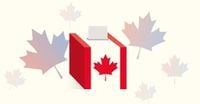In a closely contested election held on April 28, 2025, Prime Minister Mark Carney and his Liberal Party narrowly failed to secure a majority in Canada’s Parliament, winning 169 seats out of 343. The Conservative Party, led by Pierre Poilievre, captured 144 seats. This election was marked by heightened tensions with the United States, particularly due to President Trump’s imposition of tariffs on Canadian goods, which had a significant impact on the political landscape.
The election results reflect a decisive rejection of Poilievre's American-style conservative politics, as Canadians opted for the values that define their nation, including strong public services and a commitment to social welfare. Carney, a political newcomer who previously led two G7 central banks, centered his campaign on addressing the challenges posed by Trump’s administration and the economic uncertainties that have arisen from it.
Bea Bruske, President of the Canadian Labour Congress, congratulated Carney on his victory, emphasizing the urgent need for action from the new government. "Canadians are counting on Prime Minister Carney to move quickly. The time for hesitation is over," Bruske stated. With over 3 million workers represented by the Canadian Labour Congress, Bruske highlighted the immediate priorities that the government must address, including the reform of the Employment Insurance system, investments in public health care, and tackling the housing crisis.
Bruske outlined a vision for a fairer, more resilient economy, stating, "We cannot cut our way to prosperity. Now is the time to build—by investing in people and the public systems that support them." The Canadian Labour Congress is ready to work with the government on multiple fronts, including expanding access to health care, addressing corporate price gouging, and creating good union jobs through investments in infrastructure and clean energy.
Despite the Liberal Party's success, the election results left Carney needing support from smaller parties to pass legislation, as the Liberals fell just three seats short of a majority. The Bloc Québécois secured 22 seats, the New Democratic Party won 7, and the Green Party obtained 1 seat, all of which could play critical roles in shaping the new government’s agenda.
Notably, two ridings were won by less than 40 votes, underscoring the election's competitiveness and the potential for future political shifts. Poilievre’s defeat was exacerbated by the loss of his own seat, a position he had held for 20 years, to a Liberal candidate. This loss signals a significant shift in the Conservative Party's standing and raises questions about its future direction.
The election was further complicated by external events, including a tragic incident in Vancouver where a man drove an SUV into a crowd at a Filipino community festival, resulting in at least 11 deaths and many injuries. Both Carney and Poilievre acknowledged this tragedy during their final campaign events, though it remained unclear how it might affect the election outcome.
In his acceptance speech, Carney warned Canadians of the difficult times ahead, asserting his commitment to protecting Canadian interests against U.S. pressures. He stated, "As I’ve been warning for months, America wants our land, our resources, our water. President Trump is trying to break us so he can own us. That will never happen." His message resonated with voters who are increasingly concerned about the implications of U.S. policies on Canada.
Trump’s aggressive stance towards Canada, including tariffs on key industries like autos, steel, and aluminum, fueled a wave of patriotism that ultimately helped Carney’s campaign. The election was seen as a referendum on Trump’s treatment of allies and trading partners, with many Canadians expressing their desire for a government that would stand firm against such pressures.
As the election results settled, analysts noted that Carney's pragmatic and centrist approach appeared to align with the mood of Canadians after a decade of Justin Trudeau's progressive agenda. Carney's ability to convey a serious tone and defiance toward Trump’s rhetoric helped sway undecided voters, particularly those who may have considered supporting the Conservatives.
Looking ahead, the new government faces pressing challenges, including economic volatility and the need for immediate reforms in various sectors. The Canadian Labour Congress is poised to collaborate with the government to address these issues, emphasizing the importance of public health care, affordable housing, and the creation of sustainable jobs.
As Canadians reflect on the election results, the path forward remains uncertain, but the call for action is clear. With Carney at the helm, the expectation is for a government that not only responds to the immediate needs of its citizens but also stands resilient against external pressures. The coming weeks will be crucial in determining how effectively the new government can navigate these challenges and fulfill the promises made during the campaign.





